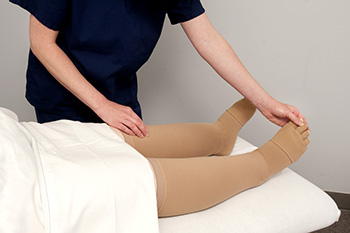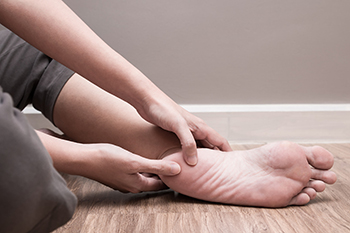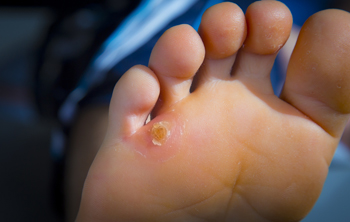Items filtered by date: September 2021
Top 5 Causes of Swollen Feet
There are many possible causes of swollen feet—ranging from mild, temporary conditions to severe medical emergencies. Here is a run-down of the top 5: 1) Trauma. After an injury, the body’s inflammatory response floods the injured area with white blood cells, antibodies, proteins, and other fluids, causing swelling and inflammation. 2) Diseases. Diseases of the heart, kidney, liver, and lymphatic system can compromise the body’s ability to pump or regulate the blood, and expel wastes, causing a build-up of fluid in various parts of the body—including the feet and legs. 3) Venous Insufficiency. Swelling in the feet and legs may occur when the venous valves—which return blood back to the heart—are damaged and dysfunctional. 4) Pregnancy. Hormonal surges and a growing uterus pressurize veins and increase water and sodium—leading to edema (swelling) in the feet, hands, and legs. 5) Inactivity. Sitting or standing still for prolonged periods of time can cause fluid to temporarily accumulate in the tissues of the feet and ankles. If your feet or ankles become swollen or painful, schedule an appointment with a podiatrist.
Foot Pain
Foot pain can be extremely painful and debilitating. If you have a foot pain, consult with one of our podiatrists from Parkwood Podiatry. Our doctors will assess your condition and provide you with quality foot and ankle treatment.
Causes
Foot pain is a very broad condition that could be caused by one or more ailments. The most common include:
- Bunions
- Hammertoes
- Plantar Fasciitis
- Bone Spurs
- Corns
- Tarsal Tunnel Syndrome
- Ingrown Toenails
- Arthritis (such as Gout, Rheumatoid, and Osteoarthritis)
- Flat Feet
- Injury (from stress fractures, broken toe, foot, ankle, Achilles tendon ruptures, and sprains)
- And more
Diagnosis
To figure out the cause of foot pain, podiatrists utilize several different methods. This can range from simple visual inspections and sensation tests to X-rays and MRI scans. Prior medical history, family medical history, and any recent physical traumatic events will all be taken into consideration for a proper diagnosis.
Treatment
Treatment depends upon the cause of the foot pain. Whether it is resting, staying off the foot, or having surgery; podiatrists have a number of treatment options available for foot pain.
If you have any questions, please feel free to contact our offices located in Brunswick and Hinesville, GA . We offer the newest diagnostic and treatment technologies for all your foot care needs.
Do You Suffer From Painful Feet?
Foot Care Tips for Diabetic Patients
 Because of the potential loss of feeling in the feet, diabetic patients must be mindful of their everyday foot health in order to avoid more serious issues. First, diabetic patients should check their feet daily for any cuts, blisters, nail problems, or wounds in general. Second, they should moisturize their feet regularly to prevent cracking. Lastly, they should schedule regular check-ups with a podiatrist for a foot exam to prevent further complications. In fact, regular checkups with a podiatrist can reduce the risk of amputation from anywhere between 45 and 85 percent. There are also a few things diabetic patients should avoid in order to take care of their feet. Heating pads and electric blankets shouldn’t be used in order to prevent the feet from getting burned. They should also make sure to not remove any corns or calluses on their own, but instead consult with a podiatrist. If you are a diabetic patient and have issues with your feet, or you need a checkup, please schedule an appointment with a podiatrist.
Because of the potential loss of feeling in the feet, diabetic patients must be mindful of their everyday foot health in order to avoid more serious issues. First, diabetic patients should check their feet daily for any cuts, blisters, nail problems, or wounds in general. Second, they should moisturize their feet regularly to prevent cracking. Lastly, they should schedule regular check-ups with a podiatrist for a foot exam to prevent further complications. In fact, regular checkups with a podiatrist can reduce the risk of amputation from anywhere between 45 and 85 percent. There are also a few things diabetic patients should avoid in order to take care of their feet. Heating pads and electric blankets shouldn’t be used in order to prevent the feet from getting burned. They should also make sure to not remove any corns or calluses on their own, but instead consult with a podiatrist. If you are a diabetic patient and have issues with your feet, or you need a checkup, please schedule an appointment with a podiatrist.
Diabetic foot care is important in preventing foot ailments such as ulcers. If you are suffering from diabetes or have any other concerns about your feet, contact one of our podiatrists from Parkwood Podiatry. Our doctors can provide the care you need to keep you pain-free and on your feet.
Diabetic Foot Care
Diabetes affects millions of people every year. The condition can damage blood vessels in many parts of the body, especially the feet. Because of this, taking care of your feet is essential if you have diabetes, and having a podiatrist help monitor your foot health is highly recommended.
The Importance of Caring for Your Feet
- Routinely inspect your feet for bruises or sores.
- Wear socks that fit your feet comfortably.
- Wear comfortable shoes that provide adequate support.
Patients with diabetes should have their doctor monitor their blood levels, as blood sugar levels play such a huge role in diabetic care. Monitoring these levels on a regular basis is highly advised.
It is always best to inform your healthcare professional of any concerns you may have regarding your feet, especially for diabetic patients. Early treatment and routine foot examinations are keys to maintaining proper health, especially because severe complications can arise if proper treatment is not applied.
If you have any questions please feel free to contact our offices located in Brunswick and Hinesville, GA . We offer the newest diagnostic and treatment technologies for all your foot and ankle needs.
Preventing Plantar Fasciitis
Plantar fasciitis is a common cause of heel pain. The plantar fascia is a ligament that runs along the bottom of the foot and connects the heel bone to the toes. When this ligament is damaged, usually through repetitive overuse, it can become inflamed and lead to heel pain, arch pain, swelling, and tenderness. Fortunately, there are many steps that you can take to prevent plantar fasciitis. Wearing shoes that fit well and provide cushioning and arch support, or wearing orthotic inserts, may give your foot the protection it needs to avoid injuries. Foot stretching and strengthening exercises can increase the flexibility and strength of your feet, making injuries less likely. Plantar fasciitis is often associated with being overweight or obese, as extra weight can strain the feet. For this reason, maintaining a healthy weight is also suggested. One of the most important things that you can do to prevent plantar fasciitis is to exercise appropriately. Increase the duration and intensity of your workouts slowly over time, give your feet time to rest following a workout, and stop if you begin to feel pain. To learn more about plantar fasciitis, please consult with your podiatrist.
Plantar fasciitis can be very painful and inconvenient. If you are experiencing heel pain or symptoms of plantar fasciitis, contact one of our podiatrists from Parkwood Podiatry. Our doctors can provide the care you need to keep you pain-free and on your feet.
What Is Plantar Fasciitis?
Plantar fasciitis is the inflammation of the thick band of tissue that runs along the bottom of your foot, known as the plantar fascia, and causes mild to severe heel pain.
What Causes Plantar Fasciitis?
- Excessive running
- Non-supportive shoes
- Overpronation
- Repeated stretching and tearing of the plantar fascia
How Can It Be Treated?
- Conservative measures – anti-inflammatories, ice packs, stretching exercises, physical therapy, orthotic devices
- Shockwave therapy – sound waves are sent to the affected area to facilitate healing and are usually used for chronic cases of plantar fasciitis
- Surgery – usually only used as a last resort when all else fails. The plantar fascia can be surgically detached from the heel
While very treatable, plantar fasciitis is definitely not something that should be ignored. Especially in severe cases, speaking to your doctor right away is highly recommended to avoid complications and severe heel pain. Your podiatrist can work with you to provide the appropriate treatment options tailored to your condition.
If you have any questions please feel free to contact our offices located in Brunswick and Hinesville, GA . We offer the newest diagnostic and treatment technologies for all your foot and ankle needs.
What Are the Treatments for Foot Corns?
Corns are small lumps of thickened, hardened skin that occur due to friction or pressure on an area of the foot. They are most often located in between the toes, on top of the toes, or on the soles of the feet. Corns can be uncomfortable or even painful, but non-surgical treatment is usually successful. Most of these treatments work by off-loading, or taking the pressure off of, the corn. Your doctor may ask you to wear a padded corn sleeve over the corn if it is located on your toe. If the corn is located between the toes, you may be asked to wear a toe spacer between the affected toes to take pressure and friction off the corn. A corn donut, which is a padded, donut-shaped device, can be placed around the corn to off-load it. If it is associated with a large callus, your doctor can also trim the corn. If you suffer from painful foot corns, please schedule an appointment with a podiatrist near you.
Corns can make walking very painful and should be treated immediately. If you have questions regarding your feet and ankles, contact one of our podiatrists of Parkwood Podiatry. Our doctors will treat your foot and ankle needs.
Corns: What Are They? And How Do You Get Rid of Them?
Corns are thickened areas on the skin that can become painful. They are caused by excessive pressure and friction on the skin. Corns press into the deeper layers of the skin and are usually round in shape.
Ways to Prevent Corns
There are many ways to get rid of painful corns such as:
- Wearing properly fitting shoes that have been measured by a professional
- Wearing shoes that are not sharply pointed or have high heels
- Wearing only shoes that offer support
Treating Corns
Although most corns slowly disappear when the friction or pressure stops, this isn’t always the case. Consult with your podiatrist to determine the best treatment option for your case of corns.
If you have any questions please feel free to contact our offices located in Brunswick and Hinesville, GA . We offer the newest diagnostic and treatment technologies for all your foot and ankle needs.




